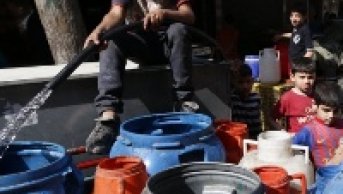Turkey Progresses in Harmony with EU Water Framework Directive

Within the scope of Turkey’s negotiations with the EU on the environment chapter, ongoing since Dec. 21, 2009, Turkey is required to integrate the EU Water Framework Directive into its water-related policies, regulations and laws due to its candidate status.
There are two main processes of harmonization in the directive, which is one of the difficulties encountered by Turkey in its harmonization efforts. The first process of harmonization is the adoption of EU legislation and its implementation, while the second process is infrastructural investments by both the public and private sectors required for full harmonization. For these processes, there are two primary documents that constitute the initiative. The first document is the Accession Partnership document, which has short-term and medium-term targets in line with the Copenhagen criteria for EU candidate countries. The first Accession Partnership document for Turkey was prepared in 2001, and it was deemed suitable for Turkey to launch efforts in line with harmonization with the 2003 Accession Partnership document, with the water quality legislation that is found within the short-term objectives mentioned in the Accession Partnership document. It was concluded that 12 EU directives on water quality should be handled. Also in 2005, 2007 and 2009, the Accession Partnership document for Turkey was updated. The second document is the national program titled “Turkish National Program for the adoption of the Aquis” in response to the Accession Partnership document. In the national program, water legislation was handled along with environmental issues.
Within the harmonization process, many changes have taken place regarding water resource management in our country since 2003. In order for Turkey to close the Environment Chapter, the process of implementing the Water Framework Directive is supposed to be completed and implemented while basin management plans, one of the most important objectives of the directive, should be prepared.
In hydrological terms, Turkey, which has 25 river basins, primarily prepared a wastewater action plan and river basin protection action plans (RBPAPs) for 25 basins within the process of preparing basin management plans. The river action plans for 11 basins have been completed, while those for 14 others are expected to be completed by the end of 2013. In order for basin management plans to be implemented, regulations related to water quality and quantity have to be strong, but there are gaps in this field, and a newly established Directorate of Water Management has been carrying out efforts in this regard. As a first step, steps on chemical and biological monitoring have been taken.
The EU Water Framework Directive, which came into force in December 2000, primarily aims for a “good status” for all ground and surface waters in the EU. Hence, the directive demands that both member and candidate countries make a situation analysis on the quality of their bodies of water. When all the basins of Turkey were analyzed in terms of water quality, it appeared that 20 percent of them were of a good quality while 80 percent were deemed to require management in terms of quantity and quality.
Within this process, preparations for a new water law were brought onto the agenda. As the Law on Water (1926) was unable to meet existing needs, a new water law was needed that would also address the conflict of authority and responsibility in the current water legislation, the gaps in water-related legislation, a growing population, urbanization and the necessity of assessing water not only in terms of quantity but also in terms of quality due to other factors. In this respect, a process was launched to prepare a new water law. Currently, draft work has been completed and opened for discussion, and this new water law, which was reviewed before being presented to Parliament, will further reinforce the implementation of the EU Water Framework Directive and also meet Turkey’s needs.
Also, within the scope of harmonization with the directive, the EU and the General Directorate of Water Management have been carrying out projects for many years. In order to implement EU Water Framework Directive No. 2000/60/EC, a MATRA project, “Implementation of the Water Framework Directive,” was prepared and launched in Turkey in 2001. The first project focuses on the Büyük Menderes basin and is a pilot project in terms of the implementation of the directive. The project has been finalized and accordingly, a comprehensive water law should be prepared and the authority and responsibilities of relevant organizations should clearly be stated in the new law. A national water resources policy should be established, an integrated water basin management should be implemented in river basins and the private sector, municipalities and the relevant public officials should participate in water management at a regional level. This will be a model to other basins later on. In line with this project, the necessary adjustments have started as mentioned above.
In addition, within the process of harmonization with the EU Water Framework Directive, the General Directorate of Water Management has been carrying out a capacity developing project on monitoring water quality, basin protection action plans and Projects of Capacity Building to Implement a Flood Directive in Turkey to achieve the process.
During the implementation process of the EU Water Framework Directive, Turkey made the necessary adjustments in both its legislation and its organizations to successfully complete the process. With the work on the new water law, river basin management, water quality as well as its water legislation on groundwater and drinking water, Turkey has made progress as noted in the “Progress Report of the European Commission” issued in 2012.




